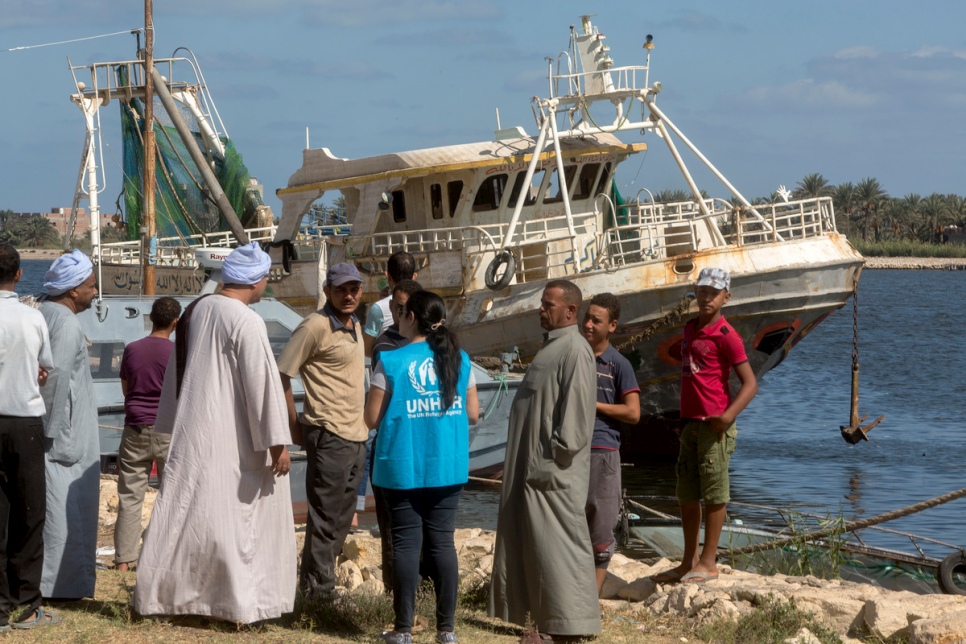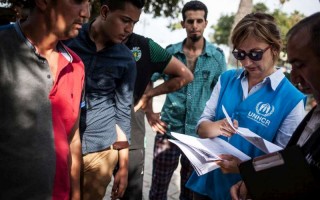
Egyptian Army personnel stand guard at a Naval station in Rashid, Egypt, beside the wreckage of an Egyptian fishing boat that recently capsized off the coast killing at least 202 people. © UNHCR/Scott Nelson
ALEXANDRIA, Egypt – As a fishing trawler packed with hundreds of people flipped and sank off the coast of Egypt last week, Somali Abshiro* suddenly found herself in the water as those drowning clawed at her life jacket.
“I have been fighting for my life in the water, not just because I didn’t know how to swim, but because people were trying to take my lifejacket. I was bitten in my hand,” Abshiro told UNHCR, the UN Refugee Agency, in an interview following the tragedy.
Ruthless smugglers had crammed up to 500 people onto the trawler, which was bound for Italy from Egypt when it capsized and sank off the coast of Rashid, Egypt, on September 21. Twenty-one-year-old Abshiro was among 164 survivors who included Egyptians, Sudanese, Eritreans, Ethiopians and a Syrian.
So far 202 bodies have been pulled from the water. Thirty-three were recovered from the sunken boat itself, including two children and a woman trapped as it filled with water and sank.
Egypt has a long history of providing asylum to refugees and at the same time is a traditional route of irregular migration to Europe by sea.
Speaking to survivors, several described how the overcrowded boat started rocking and people began to feel scared. A fight broke out and led to the capsizing, pitching hundreds of men, women and children into the water, many without lifejackets and unable to swim.
“Many didn’t have life jackets. People were pulling each other down trying to stay afloat.”
“I can’t forget the bodies. I was clinging to one trying to stay afloat,” says Achan,* a 35-year-old lawyer from Darfur, Sudan, who was making her fourth attempt to cross to Europe when the boat foundered.
“Many didn’t have life jackets, so a lot of fighting was happening in the water. People were pulling each other down trying to stay afloat. This made the whole situation even worse,” she recalls.
As the boast tipped, the crew and passengers started calling the police and the Navy and sending distress signals, survivors said. Some managed to jump and swim away from the boat while others were trapped.
“I couldn’t swim, even though I had my life jacket on,” recalls Abrihet,* a 33-year-old Eritrean who relied on others in the water to pull her clear.

A UNHCR staff member talks with Egyptian fishermen near the retrieved wreckage of an Egyptian fishing boat in Rashid, Egypt, on September 28, 2016. © UNHCR/Scott Nelson
Since 2014, there has been a steady increase in the number of interceptions of refugees and migrants trying to leave Egypt in an irregular manner, UNHCR has reported. Some survivors said they had made previously made unsuccessful attempts to reach Europe before the tragedy.
While the total number of Mediterranean crossings so far this year is 42 per cent lower than during the same period last year, the number of people reported dead or missing so far this year (3,498) remains high.
Following the fatal sinking, the Egyptian government has arrested at least four of the boat’s crew members. They remain in custody and may face charges, including human trafficking and wrongful death.
“An Egyptian man… found his youngest child dead. He kissed him and put him back in the water.”
In fresh insights into the deadly trade, survivors told how they paid the smugglers US$1,000 to US$1,700 to make the crossing. Assigned a meeting point, they were collected on minibuses and taken to a warehouse, and then ferried out to the vessel at night in smaller fishing boats.
The majority of those aboard the boat were Egyptians. Survivors say that about 100 African nationals were in two rooms on the lower deck, and women and children were in three other rooms on the middle and top decks.
In the wake of the tragedy, UNHCR and its partners responded immediately to assess the conditions and protection needs of the 43 foreign survivors, and to provide humanitarian assistance. It has also given medical attention and much needed psycho-social support to survivors struggling to deal with the horrors they witnessed.
“An Egyptian man was calling his children’s names in the dark. He found his youngest child dead. He kissed him and put him back in the water,” says Amir,* a Somali survivor who teared up as he spoke, visibility upset and angered by all he had been through.
The Egyptian government has arrested nearly 5,000 foreign nationals for irregular departure from its north coast this year, and has followed a policy of releasing all those who are registered as asylum-seekers and refugees with UNHCR in Egypt.
UNHCR has confirmed the detainees’ registration status to the authorities and is advocating for their prompt release, while continuing to provide support and assistance during their detention.
The refugee agency will continue to monitor the situation of the detainees closely, particularly given the increased government scrutiny of this incident, and to advocate for the protection of all persons of concern to UNHCR.
*All names have been changed for protection reasons.
By: Nora Ibrahim





